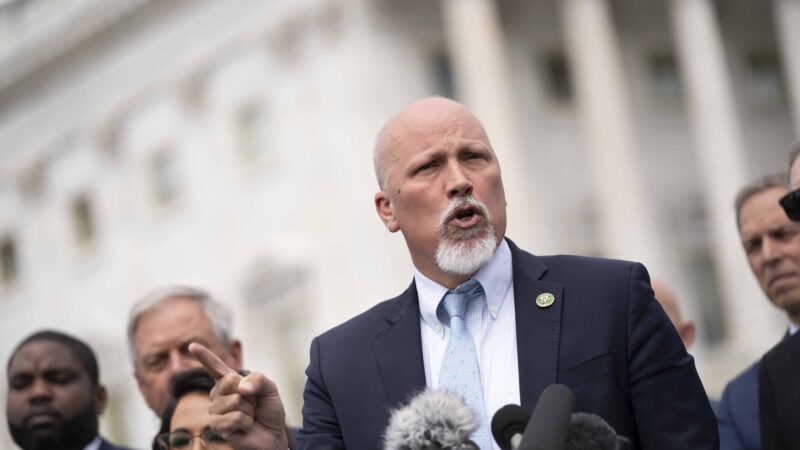Conservatives Rage Against Debt Ceiling Bill: 'Not One Republican Should Vote for This'
But a lot of Republicans probably will.

Making a deal with President Joe Biden might have been the easy part.
Now, with the clock ticking towards a possible default on the national debt, Speaker of the House Kevin McCarthy (R–Calif.) is facing a new challenge that looks pretty familiar: opposition from the right-wing faction within the House Republican caucus, the same group that stalled McCarthy's election to lead the chamber in January.
"I want to be very clear. Not one Republican should vote for this bill," said Rep. Chip Roy (R–Texas) during a press conference Tuesday afternoon called by the House Freedom Caucus, the formerly libertarian group that's maintained its reflexive sense of fiscal responsibility even as it has turned more conservative in recent years.
But as they did during the January showdown over McCarthy's speakership, most Republicans will likely vote for the package and avoid a possible default. Unlike in January, McCarthy is likely to get some support from Democrats—a federal default provides little political upside for the party currently occupying the White House—limiting the leverage the House Freedom Caucus can apply.
But the group's objections are not superfluous. Since March, conservatives in the House have made clear they want to see significant spending cuts attached to any debt ceiling increase. The House passed a bill last month to do that: The Limit, Save, Grow Act would have reset the federal budget baseline to where it was last year, effectively cutting the new spending included in the $1.7 trillion omnibus bill that passed in December. It would also have placed stricter limits on future spending growth for the next decade, rather than a two-year cap on nondefense discretionary spending, which is a part of the budget that isn't really growing anyway.
The House Freedom Caucus is also grumpy about McCarthy's failure to secure a larger cut to IRS funding. The deal will only claw back about a quarter of the $80 billion in new funding given to America's tax cops last year.
"This deal fails—fails completely," House Freedom Caucus Chairman Scott Perry (R–Pa.) said during the Tuesday press conference. Perry blasted McCarthy for squandering what he said was "the strongest position a Republican has had certainly in our elected lifetimes here, and…probably since we've been paying attention" to force budget cuts that could curb the nation's growing pile of debt.
But that's a telling remark. It seemingly ignores the first two years of the Trump administration, when Republicans controlled both chambers of Congress and the White House—and responded by hiking spending and inflating the deficit.
Members of the House Freedom Caucus may be sincere in their opposition to this deal and their commitment to cutting spending. Unfortunately, the track record of the Trump years suggests Democrats are at least partially correct in their belief that Republicans only use fiscal responsibility as a cynical justification for blocking Democratic policy priorities.
But with just days left until the federal government defaults, the operative question is whether the House Freedom Caucus can translate its opposition to the deal into a legislative roadblock. We'll get that answer late Tuesday, when the House Rules Committee takes up the debt ceiling bill. As Politico reports, that meeting is likely the conservatives' best chance at stopping the bill. That's because the House Freedom Caucus negotiated to get more seats on the powerful Rules Committee during the standoff over McCarthy's speakership election. Roy is a member of the committee, along with two other members of the Freedom Caucus: Reps. Thomas Massie (R–Ky.) and Ralph Norman (R–S.C.). Norman has sharply criticized the deal, while Massie has pointed out on Twitter (correctly) the debt limit bill doesn't actually spend any money but only allows for borrowing to fund spending Congress already approved.
"We'll be taking out a second mortgage this week to pay off the credit cards but it's not until September," when the annual budget is set to be debated and voted, "that we're actually buying the bass boat, the tanning bed, and a big screen TV," Massie wrote.
Massie's vote will be critical, but his point is arguably more important. The debt ceiling bill, regardless of what it contains or lacks, is not going to single-handedly solve or doom America's fiscal status. Only more responsible budgeting from Congress and the president can do that.


Show Comments (191)